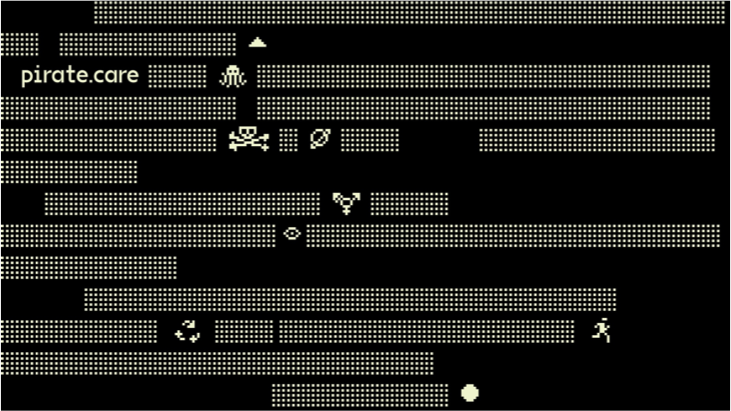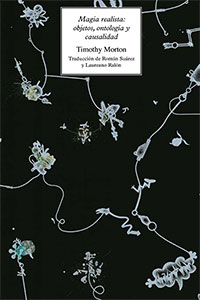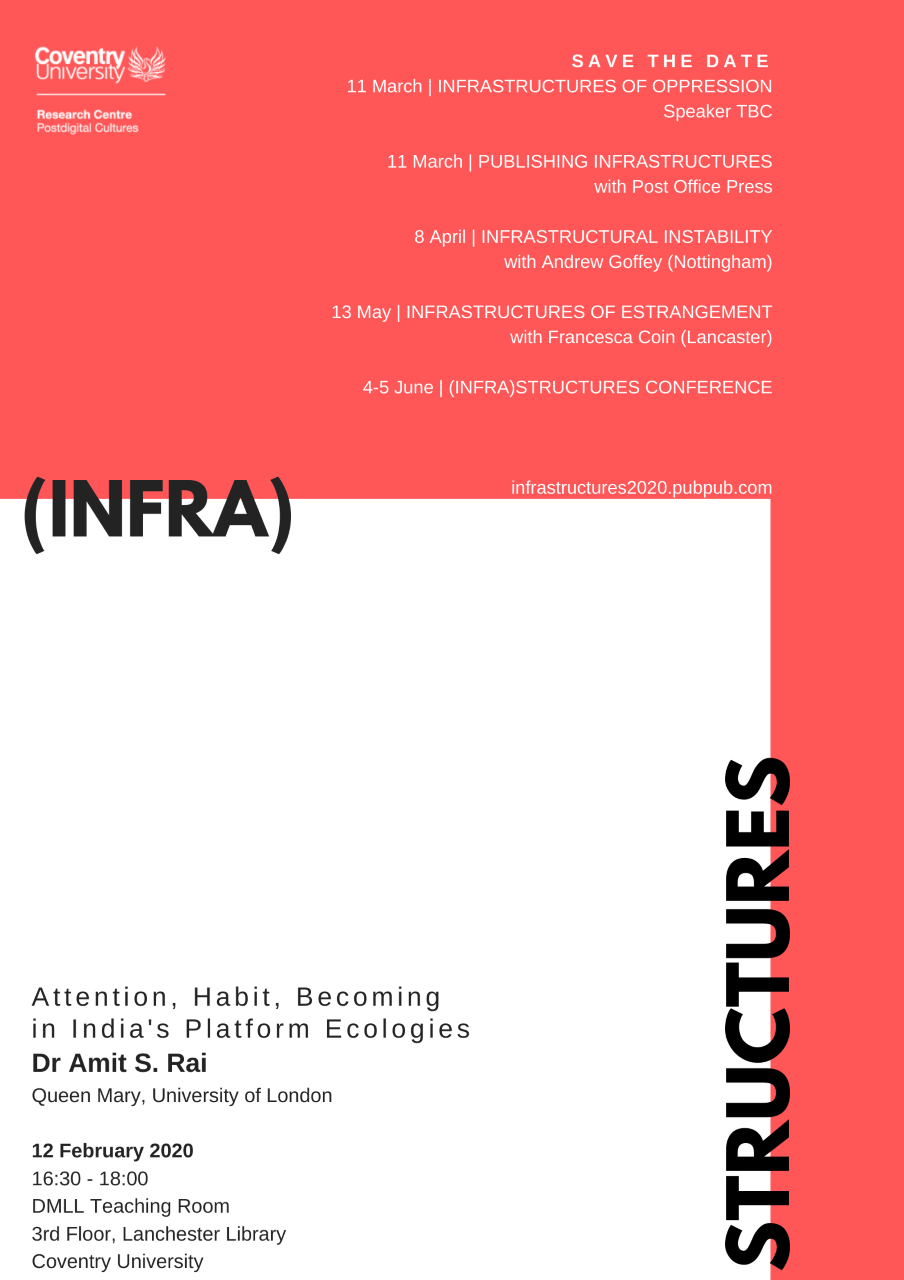Postdigital Politics in a Time of Pandemics I: On the Commons and the Crisis of Representative Democracy
 Saturday, April 11, 2020 at 12:34PM
Saturday, April 11, 2020 at 12:34PM ('Postdigital Politics in a Time of Pandemics II: If We Can Have Disaster Capitalism, Why Can’t We Have Emergency Marxism?', is available here.)
I'm going to begin with a proposition. In recent years a lot of work in the humanities and social sciences has been taken up with the commons. It’s a fascination that is only likely to increase following the coronavirus pandemic of 2019-2020. Over the next few years attention will understandably be paid to the manner in which communities all over the world spontaneously self-organised to fill the gaps left by the market and the state. They did so by collectively providing those in need with everything from information and accommodation, through hand sanitizer and medical supplies, to emergency childcare, financial aid packages, even company in periods of lockdown and quarantine, be it by telephone or video call.

Put simply, the commons can be understood as non-proprietary shared spaces and resources – both material and immaterial – along with the collective social processes that are necessary for commoners to produce, manage and maintain them and themselves as a community. My proposition, then, is this: if we want to actually create such commons, we need to act, work and think very differently to the ways in which most of us do now. And I include in this ‘us’ many of those who are well-known for writing about community, collectivity and the commons. Here I’m thinking here not just those who address the issue from within the liberal philosophical tradition of Garrett Hardin, Elinor Ostrom and Yochai Benkler. I also have in mind radical theorists such as Isabelle Stengers, Judith Butler, Michael Hardt and Antonio Negri.
How can we do this? How can we work and act differently from the way in which we do at present in order to help create such commons? It is this question that I am going to endeavour to answer in what follows, as it’s one that I together with a number of collaborators have been engaged with for some time.
Like the last group of writers on the commons I mentioned, a lot of those I collaborate with identify as radical theorists. However, we’re theorists who are also exploring ways of reimagining theory and what it means to be a theorist. We’re doing this by challenging some of the taken-for-granted categories and frameworks concerning what critical theory is considered to be. Specifically, we’re endevouring to move away from the highly individualistic, liberal-humanist model that’s performed by most theorists today, regardless of whether they’re Marxists, post-Marxists, feminists, new materialists, posthumanists or accelerationists. Instead, we’re experimenting with the invention of what can be called – rather teasingly, I’ll admit – ‘anti-bourgeois theory’. This is theory that, in its ‘habits of being’, to borrow a phrase from bell hooks, is:
1) consistent with the kind of progressive politics many of us in the arts and humanities espouse
It is important to be aware that neoliberalism is not directly opposed to liberalism. It is rather a version of it, as its name suggests, the wider historical tradition of liberalism having provided the discursive framework of modern capitalism. The singularized neoliberal homo oeconomicus is not necessarily always struggling against the liberal-humanist rights and values that the vast majority of theorists continue to adhere to in practice, then. Indeed, while most theorists position themselves as being politically on the left – writing books and articles about the importance of equality, cooperation, redistribution and so on – many end up operating as rampantly competitive, proprietorial individuals. Driven by a goal-fixated instrumentalism, what’s important to them are the number of books published, grants captured, keynote lectures given, followers acquired, or likes and retweets gained. (Elsewhere I’ve associated this behaviour with being a ‘micro-entrepreneur of the self’.)
2) in tune with the changing political zeitgeist, especially the shift from representative to direct forms of democracy
In the U.K. this shift can be traced at least as far back as the horizontal groundswell against the ‘old politics’ of the liberal and neoliberal establishments that was such a prominent feature of the 2014 Scottish independence referendum. Today, it can be seen in the decentralised manner in which the Extinction Rebellion movement operates: the refusal of hierarchal organisation in favour of bottom-up ‘affinity groups’.
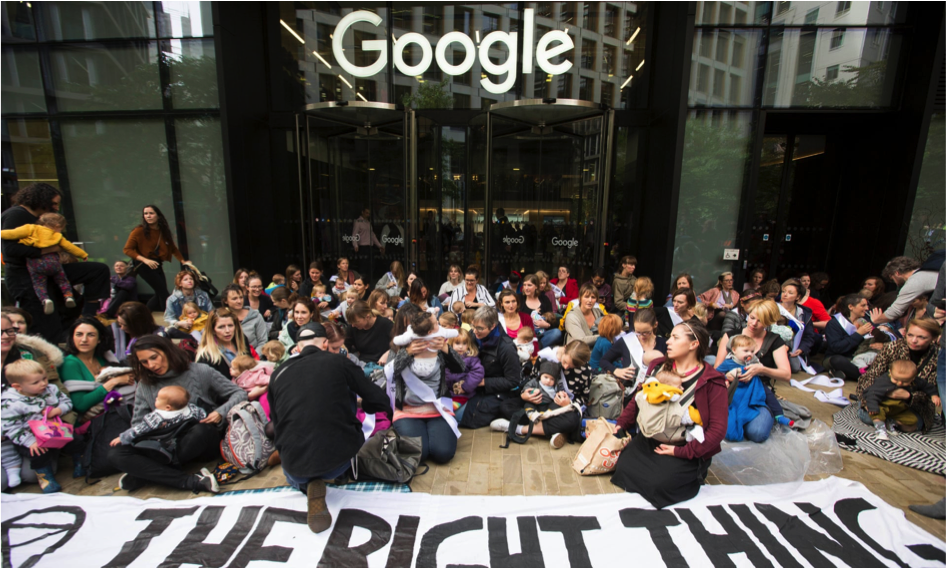 2019 Extinction Rebellion ‘nurse in’ outside Google’s London HQ
2019 Extinction Rebellion ‘nurse in’ outside Google’s London HQ
It’s not just a progressive phenomenon, though. The move to more direct forms of democracy is also apparent in the U.K. Brexit party’s rapid rise to a position of political influence under the leadership of Nigel Farage prior to the 2019 general election. In large part this rise was achieved through the adoption of the digitally savvy electoral strategy of the Five Star Movement (M5S) in Italy, which entered government in 2018, having become the largest individual party in the Italian Parliament. It uses data gathered from the online activity of members to help shape M5S’s direction and policy. So successful was the Brexit party’s adaptation of this electoral strategy that in the run up to the election the ostensibly more mainstream, one-nation Conservative politician Boris Johnson found himself forced to take up many of its more radical right-wing ideas and forms of rhetoric (albeit in detoxified form on occasion). And this in spite of the fact Farage himself has never won election to Parliament in the seven attempts he’s made over a span of two and a half decades.
3) a more appropriate mode of engagement for today’s postdigital world than are printed and closed-access books and journal articles
Arguably we find ourselves in the midst of a fourth great transformation in communications technology. Crudely put, if the first transformation involved the development of speech and language, the second writing, and the third print, the fourth entails the change from analogue to digital that is associated with the emergence of Facebook, Google and Twitter (not to forget Weibo, Baidu and WeChat in China). In fact, it can be said that we are already living in a postdigital era, if we take this term to name ‘a technical condition that… is constituted by the naturalization of pervasive and connected computing processes… in everyday life’, to the extent that ‘digitality is now inextractable from the way we live while its form, functions and effects are no longer necessarily perceptible.’ Historically, such transformations have often been followed by social and political upheaval and unrest, even war. The development of printing was at the heart of the Protestant Reformation in 16th century Europe, for example, resulting in the breaking of the religious monopoly of the Catholic Church. A key figure was Martin Luther with his Ninety-five Theses. However, although many book historians regard print as having subsequently led to the Renaissance, the Enlightenment and the development of modern science and democracy, we need to remember that print has its dark side, too. Given the anti-Semitic attack at a synagogue in the East German town of Halle in October 2019, it’s worth recalling that shortly before his death in 1546 Luther published a pamphlet called ‘Warning Against the Jews’. Nor was this a one-off. ‘We are at fault for not slaying them’, Luther proclaimed in an earlier 65,000-word treatise titled ‘On the Jews and Their Lies’. The latter text was exhibited publicly in the 1930s during the Nuremberg Rallies. (So it’s not that the disruption brought about by print is good, while that inflicted by digital media is bad.)
We’re all probably going to be long gone before anyone knows if we’re currently living through a period of change as profound as the Reformation. (Although some have heralded the Sars-CoV-2 outbreak, to give the virus its proper name, as a sign that we are. This is because of the high degree of interconnectivity of global capitalism in terms of travel, trade, tourism, migration, the labour market and supply chains, all of which depend on postdigital information processing. Along with the associated destruction of biodiversity accelerated by the climate emergency and human population growth, such interconnectivity is held as having created the conditions for new, infectious, animal-borne zoonotic diseases such as Sars, bird-flu and Covid-19 to cross over from wildlife to humans as a result of their greater proximity to one another.) Nevertheless, it’s important to make an effort to come to terms with the shift from analog to postdigital – not least for political reasons, as the above examples drawn from German history suggest.
Of course it’s questionable to what extent the traditional political division between left and right (the origins of which can be traced as far back as 1789 and the revolutionary assembly in Paris, where the antiroyalists were physically located on the left side of the chamber) is still applicable. Today the situation is complicated by the fact this division has been overlaid, at the very least, by that between populist nativism and elitist cosmopolitanism. Both the U.K. Conservative party under David Cameron, and the Labour party under Tony Blair, Gordon Brown and David Miliband were socially liberal, for example. Indeed, Cameron has said that the passing of the law enabling same-sex marriage in 2013 by the Conservative-led coalition government was one of his most significant achievements in office. The main difference between the two parties was that the Conservatives were even more economically neoliberal than New Labour. This is why the rejection of significant elements of both in the 2016 European Union referendum as primarily representing the interests of the metropolitan liberal establishment came as such a shock to many commentators. It revealed that the electorate was no longer voting largely out of loyalty to either party on the basis of their class position, with the working-class (and large parts of the Midlands and north) traditionally voting Labour. Instead, people were voting on the basis of whether they were nativist or cosmopolitan too. Actually, what the 2019 general election made clear is that if you’re poor, working class and less educated in England you’re increasingly likely to vote Conservative.
It’s going to be interesting to see if the public mood changes post-coronavirus. Will the backlash against the liberal establishment continue, or will it be replaced by a newfound respect for scientists and journalists and for institutions such as the NHS and BBC? Retaining the left/right political distinction for the time being, however, we can say that it’s been mainly those on the populist authoritarian right who, to date, have realised the possibilities created by the new communication technologies. It’s as if they’ve read their Gramsci and figured out that if you want to change politics, you need to begin by changing culture. So, to return to an international frame for a moment, the last few years have provided us with examples such as: Donald Trump, who’s been called a Twitter genius and the first meme president of the United States; Jair Bolsonaro, the first president of Brazil elected using the Internet, Google’s YouTube especially, as his main means of communication; and the U.K.’s Vote Leave campaign’s sophisticated exploitation of Facebook data to intervene in the 2016 E.U. Referendum, as revealed by the Cambridge Analytica scandal. What the actors behind these developments have done is create a new model of political communication by seizing on the opportunities created by the fourth great transformation in media technology to precipitate the cultural crisis in representative politics.
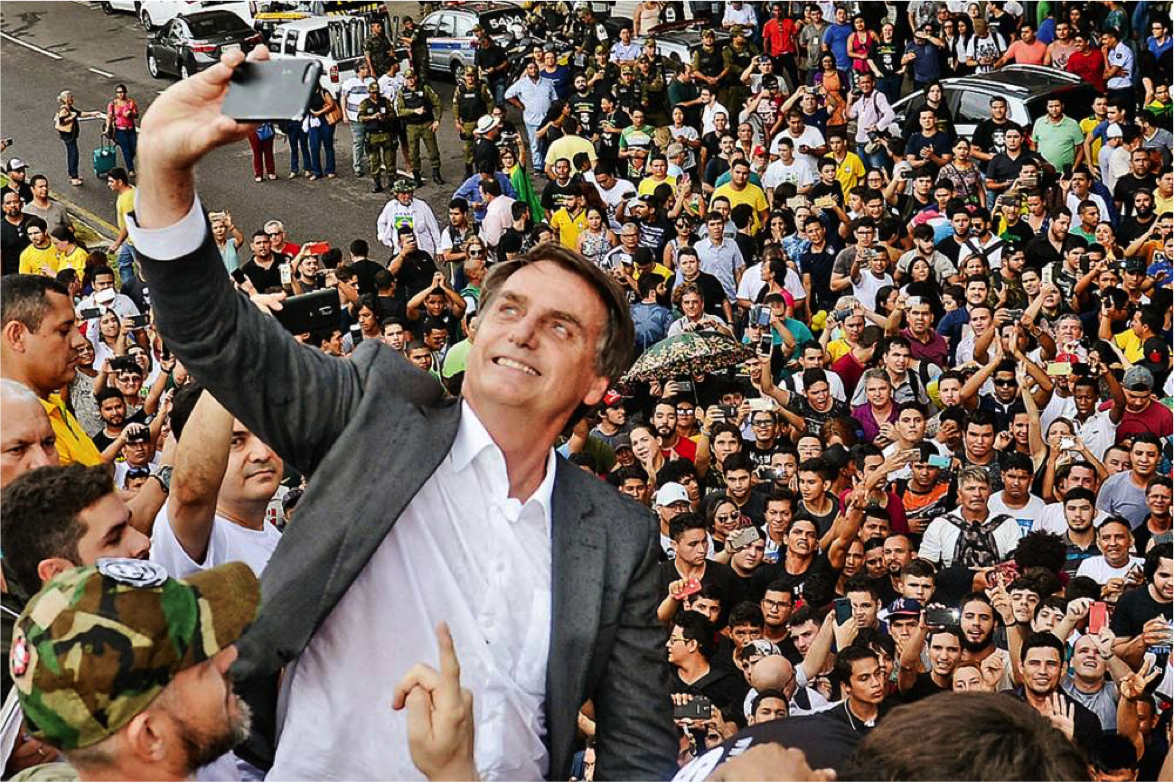 Jair Bolsonaro, President of Brazil. He has accused large parts of the media of ‘tricking’ the people over the dangers of the coronavirus, which he has likened to a ‘little flu’
Jair Bolsonaro, President of Brazil. He has accused large parts of the media of ‘tricking’ the people over the dangers of the coronavirus, which he has likened to a ‘little flu’
For populist politicians there are two distinct advantages to this new model. The first is that it enables those who don’t already have control of their state media (à la Jarosław Kaczyński in Poland and Viktor Orbán in Hungary) to sidestep the old, established forms of political communication that rely on the major newspapers and influential TV and radio programmes. They are thus able to avoid being held to account by journalists, even when they fabricate, lie, doctor videos and rebrand fake ‘fact-checking’ websites. Consider Boris Johnson’s keeping of his live interview appearances to a minimum during the 2019 U.K. election campaign; and, once in power, the attempt of his government to select which news outlets were allowed to cover it, and boycotting of leading BBC news vehicles such as Newsnight and the Today programme. Until the need to keep the population informed about Covid-19 made such a stance untenable, that is.
The second advantage is that this new model nonetheless provides populists with a means of overcoming the apparent disconnect between professional politicians and ‘the people’ – the latter being constructed antagonistically as a self-identical and essentialised mass that is prevented from reaching its full potential by an establishment ‘elite’, also homogenised, which of course doesn’t include these populist politicians themselves. The nativist right are able to overcome this disconnect by using the repetition of slogans – most famously ‘Make America Great Again’ and ‘Take Back Control’ ‘– to link the grievances of a number of different sections of society. These grievances have arisen over a long period, stretching from the so-called ‘migrant crisis’ of 2015, through the 2008 financial crisis, at least as far back as the 9/11 attacks. They include a sense of abandonment and betrayal by elites, resentment against women, Muslims and immigrants, and the general lack of control over their lives felt by many of those living through late-stage capitalism, coupled to an anxiety about the future. By articulating such sentiments with a nationalist pride, populist politicians have been able to create chains of equivalence across those parts of the population that have been adversely affected by the results of neoliberal globalization. In this way the radical right have been able to tap into those affective forces – those drives, desires, fantasies and resentments – that motivate people to become part of a group (such as precisely ‘the people’) and form the basis of collective forms of identification, and so mainstream their ideas.
Reactionary authoritarians have been aided and abetted in the creation of this new model of political communication by Silicon Valley companies. The latter are aware it’s not logical reasoning and verified evidence and information but extreme displays of emotion that keep audiences hooked, and so drive their profits by maximising attention. Not only have Twitter, Facebook and YouTube rendered indistinct the difference between making carefully thought-out comments on the current issues of the day, and hastily announcing one’s unconsidered feelings about them, they have actively amplified and rewarded expressions of anger, hatred, insecurity and shame. After all, contributions to these platforms don’t have to be true to get a reaction and go viral, just hugely captivating. Being controversial, intrusive, crude, vulgar, moralistic, narcissistic, sentimental, contradictory all works.
Similarly broadcast media often prefer adversarial debates. In the U.K. the BBC regularly invites speakers with explicitly opposing views to discuss a given topic. It does so partly out of an attempt to provide balance (although what it all too frequently ends up delivering is false equivalence, since just because someone is on the opposite side of an argument doesn’t make them qualified to speak about it). But the corporation also opposes contributors in this fashion because reputable professional journalism outlets and other high-quality mainstream sources such as Sky News and the Guardian constitute only a low percentage of where the public receives its information in the era of smartphones and social media. So the issue is not just fake news or Russian interference. It’s also that the mediascape is now highly diverse and disordered. What is needed therefore are combative debates that can cut through the chaos to be heard and get attention. (Piers Morgan’s entire career as a presenter on ITV’s Good Morning Britain has been built precisely on his ability to offer provocative opinions, be they about racism, gender fluidity, Meghan Markle or the response of the U.S. to Covid-19, in contrast to the more nuanced, easy going approach of his co-host, Suzanna Reid.)
All of which goes some way toward explaining the current situation, whereby small numbers of people are able to use communication technologies to move large numbers of others in the direction of nativist forms of populism characterised by an emphasis on authority, group insecurity and an exclusionary nationalist pride. Of course, in a situation of chaos and confusion there’s often a desire for a strong authoritarian leader who can gets things done regardless. Yet the media’s emphasis on hyper-emotionalism plays straight into the hands of the reactionary right, which defines itself negatively against those it considers ‘the other’. Hence the rise in sexism, racism and white supremacism we’ve experienced in recent times, both online and off, together with the presentation of the coronavirus as a ‘wartime’ (Johnson) or ‘invisible enemy’ (Trump), and description of it as the ‘Chinese disease’ (Trump again). (Even a pandemic is seen as national emergency from this perspective, not an international one.) Indeed, those on the anti-liberal right have been so successful in making their ideas acceptable – many produce brilliant viral videos and memes, often containing language and images that are full of humour, irony and ambiguity as well as ‘frightened bitterness’ – that they can be said to have completely transformed the political landscape. As a result, we find ourselves living in a ‘post-truth’ world of ‘alternative facts’, ‘deepfakes’, Holocaust deniers, climate-breakdown deniers, pandemic minimizers and people who are anti-immigration and anti-LGBT rights and (albeit indirectly perhaps) anti-diversity in terms of the biosphere too.
 Gary Hall | Comments Off |
Gary Hall | Comments Off | 






